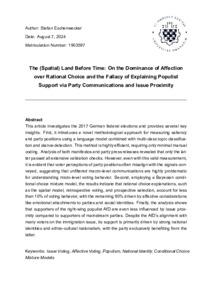|
The (spatial) land before time: on the dominance of affection over rational choice and the fallacy of explaining populist support via party communications and issue proximity
Eschenwecker, Stefan
![[img]](https://madoc.bib.uni-mannheim.de/67742/1.hassmallThumbnailVersion/Thesis%20S.%20Eschenwecker.pdf)  Vorschau |
|
PDF
Thesis S. Eschenwecker.pdf
- Veröffentlichte Version
Download (1MB)
|
|
URN:
|
urn:nbn:de:bsz:180-madoc-677428
|
|
Dokumenttyp:
|
Abschlussarbeit
, Master
|
|
Erscheinungsjahr:
|
2024
|
|
Ort der Veröffentlichung:
|
Mannheim
|
|
Hochschule:
|
Universität Mannheim
|
|
Gutachter:
|
König, Thomas
|
|
Sprache der Veröffentlichung:
|
Englisch
|
|
Einrichtung:
|
Fakultät für Sozialwissenschaften > Politikwissenschaft, Europäische Politik (König 2007-)
|
|
Fachgebiet:
|
320 Politik
|
|
Freie Schlagwörter (Englisch):
|
issue voting , affective voting , populism , national identity , Bayesian conditional choice mixture models
|
|
Abstract:
|
This article investigates the 2017 German federal elections and provides several key insights. First, it introduces a novel methodological approach for measuring saliency and party positions using a language model combined with multi-class topic classification and stance detection. This method is highly efficient, requiring only minimal manual coding. Analysis of both manifestos and party press releases revealed that only the latter passed all extensive validation checks. However, even with this valid measurement, it is evident that voter perceptions of party positions often misalign with the signals conveyed, suggesting that unfiltered macro-level communications are highly problematic for understanding micro-level voting behavior. Second, employing a Bayesian conditional choice mixture model, the results indicate that rational choice explanations, such as the spatial model, retrospective voting, and prospective selection, account for less than 10% of voting behavior, with the remaining 90% driven by affective considerations like emotional attachments to parties and social identities. Finally, the analysis shows that supporters of the right-wing populist AfD are even less influenced by issue proximity compared to supporters of mainstream parties. Despite the AfD’s alignment with many voters on the immigration issue, its support is primarily driven by strong national identities and ethno cultural nationalism, with the party exclusively benefiting from the latter.
|
 | Das Dokument wird vom Publikationsserver der Universitätsbibliothek Mannheim bereitgestellt. |
 Suche Autoren in Suche Autoren in
Sie haben einen Fehler gefunden? Teilen Sie uns Ihren Korrekturwunsch bitte hier mit: E-Mail
Actions (login required)
 |
Eintrag anzeigen |
|
|
